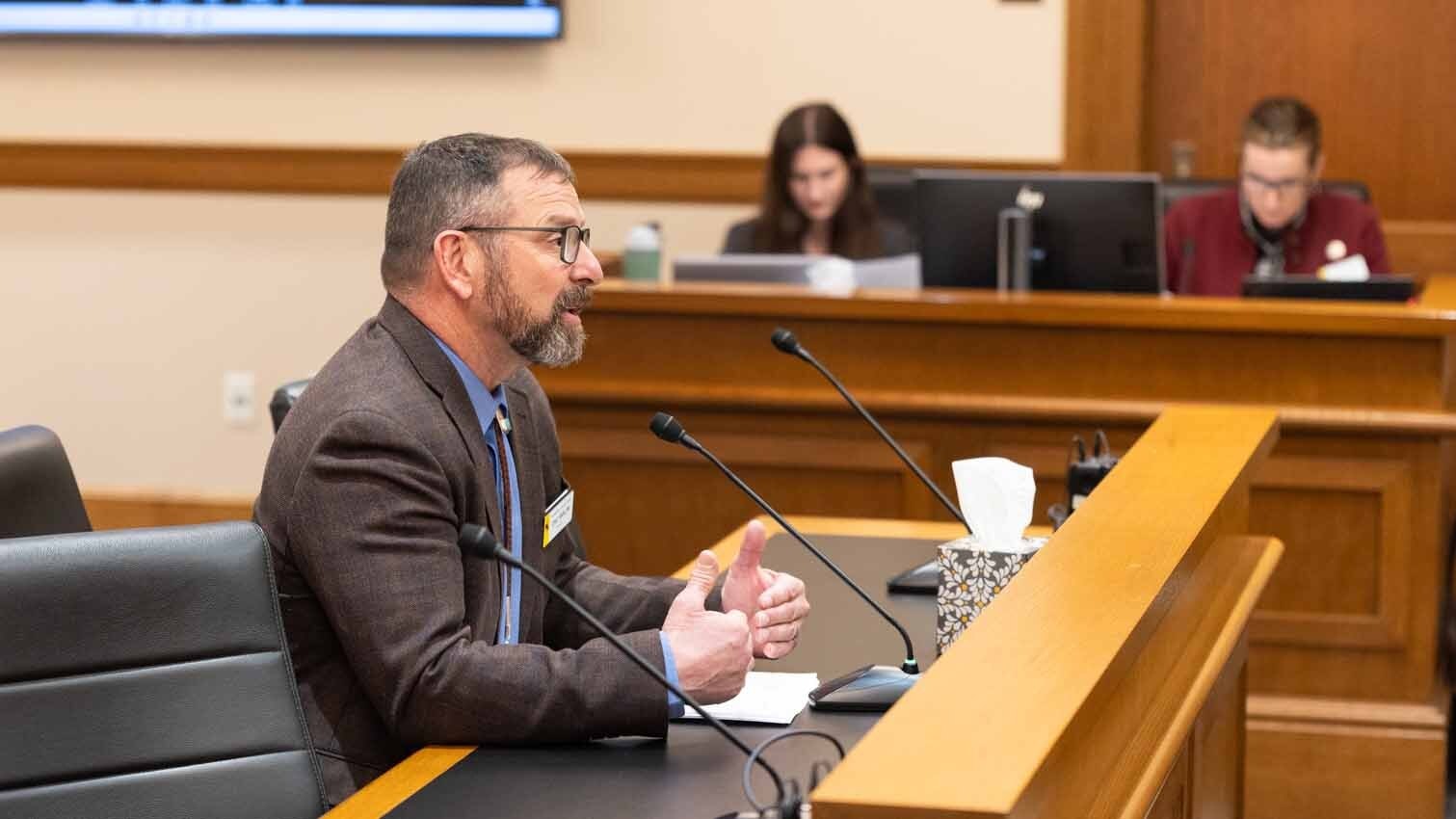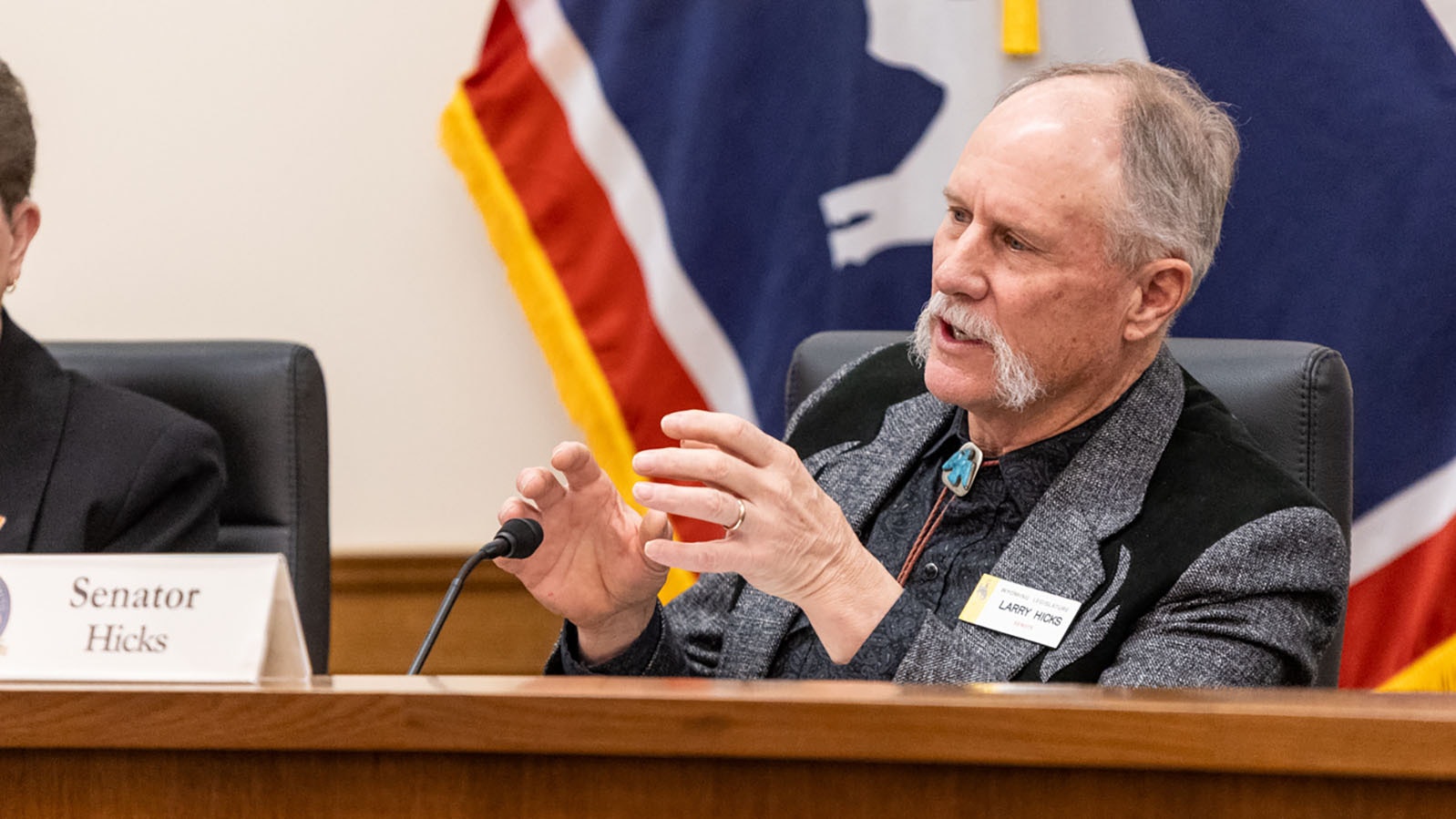A panel of the Wyoming Legislature’s highest-ranking members meeting Wednesday in Cheyenne rejected a controversial piece of legislation that would require legislative staff to keep a rolling list of emails people send to legislators.
The list was presented as a way to help the Legislative Service Office (LSO) cross-check what happens to the emails of people who believe lawmakers aren’t seeing them.
The version that entered the meeting would have required legislative staffers to publish a list of quarantined domain names, which posed security risks, LSO deputy operations administrator Anthony Sara confirmed to the panel.
Though later amended to keep that list private among legislative staffers, the bill died on a 5-5 tie vote. An individual lawmaker still could carry it into the session, which opens Feb. 9.
LSO does not block anyone’s emails and has denied lawmaker requests to do so, LSO’s IT Manager Jamie Schaub testified.
Constituent emails either go to a lawmaker’s inbox or spam/junk folder — or to a quarantine file if they trip Microsoft’s security concerns.
Many third-party-generated form emails land in the junk file, and legislators can check all those files.
Those against changing Wyoming’s laws to maintain a rolling list of emails cast the bill draft and effort behind it as a political stunt to win votes — one disguising itself as a First Amendment battle.
Proponents of the measure, conversely, said it would have restored trust with constituents by answering the perception of many that they’d been “blocked.”
The Censorship Claims
Honor Wyoming, a nonprofit corporation, spearheaded the movement toward legislating the emails issue, according to statements and testimony given Wednesday in the legislative Management Council.
It did so while claiming that 99% of more than 1,500 Wyomingites surveyed “agree” that “the Wyoming state government is violating free speech rights by blocking constituent emails to lawmakers.”
That’s the text of a June 5 email the address digital@honorwyoming.org sent to Senate President Bo Biteman, R-Ranchester, which Biteman provided Wednesday to Cowboy State Daily upon request.
The email’s subject line makes a much broader claim, that “99% of Wyomingites Say State Officials Are Violating Free Speech.”
Honor Wyoming’s email continues: “This censorship isn’t just wrong — it’s unconstitutional.”
Lawmakers in Cheyenne killed the “solution,” in the form of 2025 House Bill 338 which, Honor Wyoming asserted, would have “restored trust by requiring blocked emails to be disclosed and delivered — unless they posed a legitimate security threat.”
A March 28 Facebook post by the group says thousands of emails “have been silently blocked” by the state’s quarantine system.
‘We’ve Established That No Emails Have Been Blocked’
Biteman sparred with Honor Wyoming representative Drake Hill and with House Appropriations Chair John Bear, R-Gillette, both of whom said they wished to see an email-list bill reach the Legislature.
“We’ve established the fact that no emails have been blocked,” said Biteman to Bear. “So, you’re being disingenuous when you use the term ‘blocked.’”
Bear said he’d try not to say “blocked.”
But he countered in a later back-and-forth with Senate Majority Floor Leader Tara Nethercott, R-Cheyenne, that he views “blocked” in this context as an email not making it to one’s inbox.
When constituents’ emails don’t reach lawmakers’ inboxes, he said, many perceive they’ve been blocked, and the Legislature should be considerate of that perception.
Nethercott indicated, rather, that lawmakers should lead with basic definitions of words.
“Blocked, in my view, means rejected. Not received. Never had it,” Nethercott said.
She reiterated the point that lawmakers can review all their emails by checking their junk and quarantine files. Then she opened her junk email folder and announced some of the things she saw in it.
That Accusation
After Honor Wyoming spearheaded this issue, the Legislature formed a subcommittee on the topic.
The subcommittee met July 15. Lawmakers were paid a collective $1,045 in per diem and salary to attend it, according to LSO records. That figure doesn’t include the wages or expenses of legislative staff.
“We’ve given this issue hours this morning,” said Biteman during Wednesday’s meeting. “Staff has given us hundreds, if not thousands, of taxpayer hours on this issue. You’re getting very special treatment, Mr. Hill and Honor Wyoming.”
Biteman continued: “Your public communications via billboard and Facebook suggest legislators like myself, and our staff, intentionally censored your emails. Do you stand by that accusation?”
Hill said he was “not here to stand by it or not stand by it” but to offer solutions to what he said is an email problem. He also volunteered to connect Biteman with someone from Honor Wyoming.
“This conversation should have happened a long time ago,” said Biteman.
Biteman said that Honor Wyoming uses a bulk email service, and that the legislative system rightly classifies that output as spam.
Hill said that’s Biteman’s opinion.
He referred to earlier statements by Bear, in which Bear said even bulk-generated form emails may be the most communication a particular constituent is wiling to venture, and those are still worth lawmakers’ time.
Hill told Cowboy State Daily in a later phone interview that LSO informed the group the emails it organizes were quarantined.
Asked whether LSO ever used the word “blocked,” Hill countered, saying quarantining people’s emails is essentially a block on people’s direct communication with lawmakers, which is a high form of protected speech.
A man who said he was Honor Wyoming director John Guido agreed, saying the quarantine system “put (senders) in a second class of communication along with malicious emails, (and) they believe that’s a type of censorship.”
The man added that senators and representatives shouldn’t be going into their quarantine folders for flagged content, and that many don’t like to access their spam folders.
Hill said he’d heard from LSO that this has affected other organizations, but said those groups may not know it is happening to them if they haven’t asked about it.
That’s Because You’re Using A Platform
Nethercott issued a standalone speech “to the people of Wyoming.”
If lawmakers aren’t responding to their emails, she said, it’s either because the lawmakers aren’t reviewing or responding to those as they come, or because “you’re using a platform … that doesn’t allow them to reply back to you.”
“The Wyoming Legislature is receiving all of your emails,” she said. “We appreciate hearing from you and we want to hear from you.”
But communicating through a third-party vendor clashes with unchangeable security limits Microsoft deploys, over which the Legislature has limited control, she said.
That’s not why this topic surfaced anyway, Nethercott asserted.
“The bill before us today is about something different. It is about collecting votes. For an organization who … may or may not extol our virtues on billboards,” she said.
Biteman chuckled aloud.
Earlier in the meeting, Hill said Honor Wyoming would “extol” lawmakers “when” they had resolved the issue.
“The conversation we’re really having here today is about Wyoming being taken over by large, political, well-funded organizations — that have the ability to control your electeds through fear and misinformation, wittingly or unwittingly,” added Nethercott. “Creating confusion and fractionization of our great state. It must come to an end.”
Hill in his later interview claimed Nethercott’s speech was “political theater.”
“She’s just at odds with some of the positions Honor Wyoming has advocated,” he said. “She is not in agreement with Honor Wyoming on conservative issues. And she’s taken this opportunity to lob some grenades against Honor Wyoming, which are simply not justified.”
Nethercott fired back in a text message, calling Honor Wyoming's accusations "as careless as their work product."
“They pushed a bill draft that would publish quarantined internet domains – a dangerous proposal that demonstrates a stunning lack of understanding of basic cybersecurity and the real-world risks to Wyoming citizens," she wrote.
Hill had testified that Honor Wyoming would be fine with amending the bill to keep that list private. People could still call LSO and check to see if they were on it, under the bill draft the council contemplated.
It’s “even more shocking,” continued Nethercott, that the effort sprang from “a falsehood that legislators aren’t receiving emails. That is factually wrong and they know it.”
Wyoming deserves serious policy work, she added.
Picking Up The Phone
Sen. Barry Crago, R-Buffalo, characterized passing a new law as excessive, saying people already can handle their email concerns by contacting LSO.
He emphasized that Honor Wyoming and LSO worked together in this case, to “white-list” the group’s emails without legislation.
“Folks, whether it be from an individual or a group using a domain name, they can call our IT department and find out in a matter of seconds, most likely (whether they’re blocked),” said Crago. “Is that not a viable solution to the problem you experienced?”
Hill told the council he’d like to see a more proactive solution.
“Does it make more sense to maintain that list and be vigilant about it and aware of it on a daily basis?” said Hill. “The answer to that is, the vigilant approach is the better approach.”
Hill in his later interview said he’s not sure where Honor Wyoming-organized emails land now. When the group revives its email rally efforts it will “make sure that they are” hitting lawmakers’ inboxes, he said.
Hill did not answer directly when asked where the emails were landing in March as the 2025 session ended.
He also disagreed with the characterization of the Management Council meeting as “contentious,” saying, “if you’re taking that characterization you’re buying into a narrative that’s not true.”
The meeting was productive, Hill said.
Contentious
Still, sarcasm and tension surfaced multiple times in the meeting, from Biteman and Nethercott saying Honor Wyoming had been peddling “misinformation” to Senate Minority Leader Mike Gierau, D-Jackson, showering Bear with sarcastic commentary.
Bear referenced his military service and defense of the Constitution.
“I don’t want to let a second go by before I thank the good representative for his service to our country,” said Gierau. “His laudable, once again, efforts for the First Amendment and his advocacy for it, we all know, knows no bounds.”
Gierau challenged Bear’s deference to public perception, asking if lawmakers “should educate people on what the truth is, and that maybe sometimes we try to knock down perceptions to get to that fundamental truth?”
“I do believe that,” parried Bear. “I would say, arguably, that’s been my mission since I was first elected. … It will continue to be my mission.”
Gierau countered again: “It seems to me what we’ve got here is … a real failure to communicate what meanings of words are. What things are and what things aren’t.”
Gierau in a later phone call answered a question about his vocal tone with, “sarcastic – me?”
On Letting The People Decide
House Speaker Chip Neiman, R-Hulett, explained his aye vote as an effort to get the decision to the people’s delegates.
“I do not particularly care to add more stuff to our green books,” said Neiman.
But putting it in state law instead of internal legislative policy would cement it more, he added.
Neiman said it’s about “respecting the people’s desire to have good, and open conversations with the people.”
He’s gotten a lot of those via form emails, he said.
Bear agreed.
Crago responded to Neiman’s point, saying Neiman could field the legislation himself and as House Speaker, could make it the chamber’s top priority.
But Crago didn’t think it was an appropriate piece of legislation for the leadership panel to sponsor, he said.
Roll Call
Nethercott, Biteman, Gierau, Crago, and House Minority Floor Leader Mike Yin, D-Jackson, voted no.
Neiman and Bear voted aye. So too did Senate Appropriations Chair Tim Salazar, R-Riverton; House Majority Floor Leader Scott Heiner, R-Green River; and House Speaker Pro Tem Jeremy Haroldson, R-Wheatland.
Clair McFarland can be reached at clair@cowboystatedaily.com.






